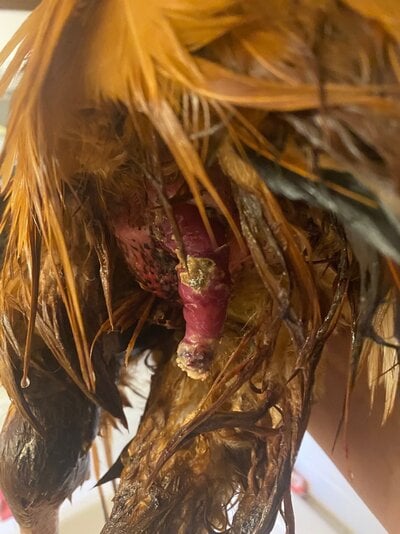I found my rooster, Nugget, like this last night. Beware- Graphic pic. Is this a prolapsed anus? This seems way worse than any pics I have seen elsewhere. He has slowed down a bit and seems to have diarrhea and this mess hanging out of him. I soaked him, cleaned him up, removed a few maggots, antibiotic sprayed him, and applied a bit of vasoline to see if I could push it back. That thing is tough and rigid and I don't know if that is normal.... doesn't seem like somethig I can put back inside of him. Paying for a vet isn't an option nor are they readily available so suggestions welcome. He stayed indoors in a crate last night but woke us up crowing. He is stil eating like a champ. Gave him some pain meds and oral antibiotic. Help please!!!
Navigation
Install the app
How to install the app on iOS
Follow along with the video below to see how to install our site as a web app on your home screen.
Note: This feature may not be available in some browsers.
More options
You are using an out of date browser. It may not display this or other websites correctly.
You should upgrade or use an alternative browser.
You should upgrade or use an alternative browser.
prolapsed anus in rooster?
- Thread starter amandadvd
- Start date
Pics
More options
Who Replied?Have you cleaned him or are those ulcers on the prolapse?
Here's what I suggest. Soak him for five minutes in warm Epsom salt bath. If you have Vetericyn wound spray, use that on the prolapse after the bath. Let it air dry a few minutes, then, with gloved hands, smear on some antibiotic ointment all over the prolpase and the opening itself.
Now, starting at the base of the prolapse, gently work it back inside, as you would a glove finger that is inside out. Got the concept? Keep working your way up the prolapse until you get it all tucked back inside. Now, hold it in for about five minutes or so.
Nix on pain meds. They can be toxic in poultry. Only a vet should administer them.
The cause of the prolapse needs to be addressed. Infection, worms, tumors, etc, can cause this. I would begin by worming him since he's feeling well and not behaving like he has an infection.
Use a gentle wormer like Safeguard and worm over a period of several days with low doses so as not to kill all all the worms at once and cause him to go into shock. Give him electrolytes during the worming process to protect him from shock.
Here's what I suggest. Soak him for five minutes in warm Epsom salt bath. If you have Vetericyn wound spray, use that on the prolapse after the bath. Let it air dry a few minutes, then, with gloved hands, smear on some antibiotic ointment all over the prolpase and the opening itself.
Now, starting at the base of the prolapse, gently work it back inside, as you would a glove finger that is inside out. Got the concept? Keep working your way up the prolapse until you get it all tucked back inside. Now, hold it in for about five minutes or so.
Nix on pain meds. They can be toxic in poultry. Only a vet should administer them.
The cause of the prolapse needs to be addressed. Infection, worms, tumors, etc, can cause this. I would begin by worming him since he's feeling well and not behaving like he has an infection.
Use a gentle wormer like Safeguard and worm over a period of several days with low doses so as not to kill all all the worms at once and cause him to go into shock. Give him electrolytes during the worming process to protect him from shock.
Good advice from @azygous
I will add a couple of things, do watch for more maggots and remove them when you see them.
If the prolapse will not stay in, keep the tissue that is exposed moist with your ointment, you don't want it to dry out, this may be why it's tough and rigid.
Lastly, do what you can. When working on him, if he shows signs of exhaustion or stress, give him a break. Hopefully, you will be able to get it back in and he recovers well.
I will add a couple of things, do watch for more maggots and remove them when you see them.
If the prolapse will not stay in, keep the tissue that is exposed moist with your ointment, you don't want it to dry out, this may be why it's tough and rigid.
Lastly, do what you can. When working on him, if he shows signs of exhaustion or stress, give him a break. Hopefully, you will be able to get it back in and he recovers well.
Last edited:
I want to add that having an antibiotic at the ready should he show signs of lethargy, therefore a hint that he has infection beginning may be wise. Tractor Supply may have these meds.
New posts New threads Active threads
-
Latest posts
-
Poll: Do high-value treats turn your chickens into savages?
- Latest: CascadiaRiver
-
-
Latest threads
-
Rooster in need of good home, Chaumont NY
- Started by BrookeP
- Replies: 0
-
-
-
Poll: Do high-value treats turn your chickens into savages?
- Started by thecatumbrella
- Replies: 1
-
-
-
Threads with more replies in the last 15 days
-
Open Contest Outdoor Garden Show—2025 BYC Summer Fair
- Started by Debbie292d
- Replies: 121
-
Racoon attack; wing torn and toes gone.
- Started by NewBeeChickGurl
- Replies: 96
-
-
-
Help vets offices closed
- Started by SouthDakotaLiving
- Replies: 71
-
×




